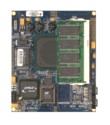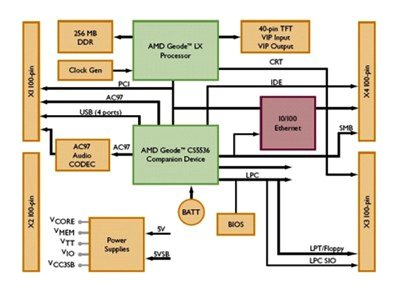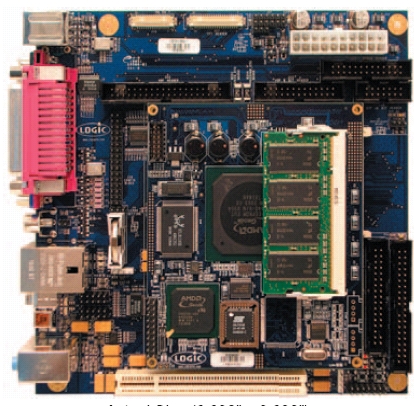AMD spins Geode LX evaluation kit
Mar 7, 2006 — by LinuxDevices Staff — from the LinuxDevices Archive — 6 views AMD has announced an evaluation kit for its low-power Geode LX x86 processor, based on an ETX format computer-on-module (COM). The Geode LX ETX RDK (reference design kit) targets applications such as kiosks, POS (point-of-sales/service) terminals, thin clients, and embedded controllers, and supports multiple operating systems… including Linux, according to AMD.
AMD has announced an evaluation kit for its low-power Geode LX x86 processor, based on an ETX format computer-on-module (COM). The Geode LX ETX RDK (reference design kit) targets applications such as kiosks, POS (point-of-sales/service) terminals, thin clients, and embedded controllers, and supports multiple operating systems… including Linux, according to AMD.
The RDK's hardware consists of an ETX form-factor COM module sourced from Logic Product Development, a long-term AMD RDK hardware partner. The ETX module integrates a Geode LX [email protected] processor together with a Geode CS5536 companion chip and up to 1 GB of DDR400 SODIMM SDRAM.
ETX modules are intended to plug into application-specific baseboards like macrocomponents — the baseboard includes a location for mounting the ETX module, and provides I/O connectors for the ETX module's various peripheral interfaces (listed below).

ETX RDK Block Diagram
(Click image for larger view)
AMD introduced the Geode LX in May of last year, claiming it would extend the x86 architecture into a broad range of resource-constrained consumer and industrial embedded applications. The LX is the first AMD-designed Geode processor subsequent to the acquisition of the Geode line from National Semiconductor in mid-2003.
Although AMD says the RDK includes “full” schematics and design documentation for an example baseboard, details on the Geode LX-based ETX module — apparently a proprietary design owned by Logic Product Development — are not included in the RDK. Consequently, the RDK is really more of an evaluation vehicle for AMD's Geode LX processor and Logic's ETX module based on it, as opposed to being a “reference design” for chip-level Geode LX designs.
AMD lists the following key features and specifications for the ETX RDK:
- ETX form-factor — 96mm X 115mm
- 6 layer, lead-free board design
- Low power — 6 W typical, 1 W standby
- 2 Mbit firmware hub boot Flash ROM in 32-pin PLCC socket
- Supports CRT, TFT, VIP input, and VIP ouput
- I/O ports:
- USB v2.0 — 4 Host ports 1 with Device capabilities
- IDE ATA 100
- AC97 v2.3
- 10/100/1000 Ethernet
- LPC, PCI, SMB
AMD says that the necessary software drivers for running Linux, Windows CE 5.0, and Windows XP Embedded on the module are available on its embedded developer Support website.
Mini-ITX baseboard also available
To speed the evaluation process, Logic also offers a ready-to-go application baseboard in the 6.7 x 6.7 inch Mini-ITX form-factor. The baseboard provides connectors into which the Geode LX ETX module can plug, and I/O connectors for convenient plug-and-play operation.

Geode LX ETX module plugged into Mini-ITX baseboard
The baseboard includes:
- TFT LCD and VGA display output
- An RJ-45 10/100/1000 Ethernet connector
- PC Card Expansion
- 3 RS232, 1 parallel, and PS/2 keyboard/mouse connectors
- 3 USB 2.0 hosts and one USB OTG (On-The-Go)
- 1 IDE port compatible with UltraATA 133/100/66/33 drives
- Audio line and mic in, headphone out
- An SPDIF in/out header
Availability
The Geode LX ETX module and optional Mini-ITX baseboard are available from Logic Product Development, according to AMD.
This article was originally published on LinuxDevices.com and has been donated to the open source community by QuinStreet Inc. Please visit LinuxToday.com for up-to-date news and articles about Linux and open source.